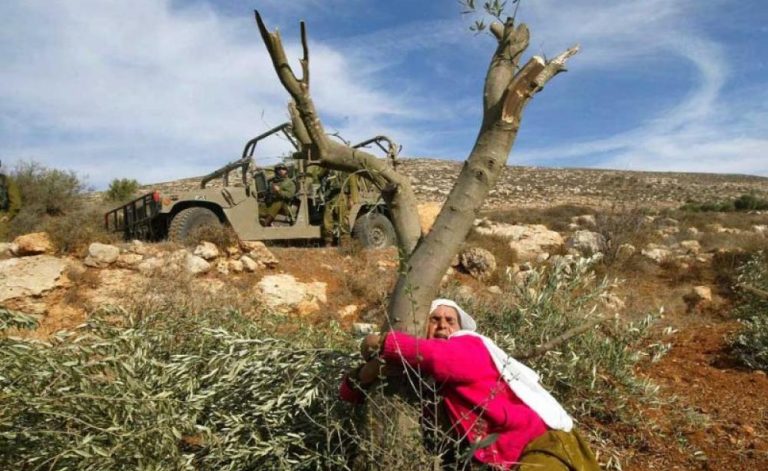
In late January, a group of masked people from a nearby village assaulted Daoud and Daher Nassar, beating them with “iron bars, large sticks, and razors,” according to the family, and landing them in the hospital with severe injuries.
Jonathan Kuttab
Tent of nations, a 100-acre farm southwest of Bethlehem in the West Bank, Palestine, has been in the Nassar family since their grandfather bought it more than a century ago. The family’s attempts to hold onto their land and prevent settlers from taking it over has been an ongoing battle—not only within the realm of the legal system. The Nassar family has had to physically defend their land, nonviolently, from repeated encroachments and attacks, which have included the burning and uprooting of their olive trees, the bulldozing of their plants, harassment and intimidation, and constant attempts to destroy the few physical structures they set up. The family’s persistence in remaining on the land has been one of the most remarkable examples of Palestinian sumud (or steadfastness) I have seen.
The story of their resistance is not just a political story of one Palestinian family’s assertion of its ancestral rights. The Nassar family members are devout Lutherans, deeply committed Christians who attempt to live out their faith in practice. They have used their property as a tangible example of their Christ-centered commitment to peace, reconciliation, and nonviolence.
The Nassars openly declare that they “refuse to be enemies,” turning their property into a “Tent of Nations” and offering hospitality and warm welcome to one and all. While insisting on their rights and absolutely refusing to leave, they do not resort to violence but stand firm with peaceful, determined nonviolent resistance.
In late January, a group of masked people from a nearby village assaulted Daoud and Daher Nassar, beating them with “iron bars, large sticks, and razors,” according to the family, and landing them in the hospital with severe injuries. The perpetrators, whose identity must be known to both the Israeli military and the Palestinian Authority, have previously made spurious claims to the land and have attacked the Nassars before. The land is in an area under Israeli control, and the Israeli military has shown little interest in pursuing the culprits or providing protection to the family. Furthermore, the Palestinian Authority has shown little interest in protecting or defending the Nassars with anything like the zeal with which they cooperate to protect any Israeli settler who strays into a Palestinian town or village. The “security coordination” between the Palestinian Authority and Israel Defense Forces does not extend to the protection of Palestinians.
The steadfast nonviolence of the Nassar family, even amid threats against their peace efforts and violent attacks against their selves, offers a sign of hope for those still seeking progress toward a just, peaceful future in the Middle East in the face of so much evidence that such progress is impossible. In their faithful persistence, the Nassar family, and many others like them, refuse to concede that the cycle of oppressive occupation and retributive violence will have the last word.
________________
Jonathan Kuttab, co-founder of Nonviolence International, is executive director of Friends of Sabeel North America, from which this is adapted.
Courtesy: SOJOURNERS